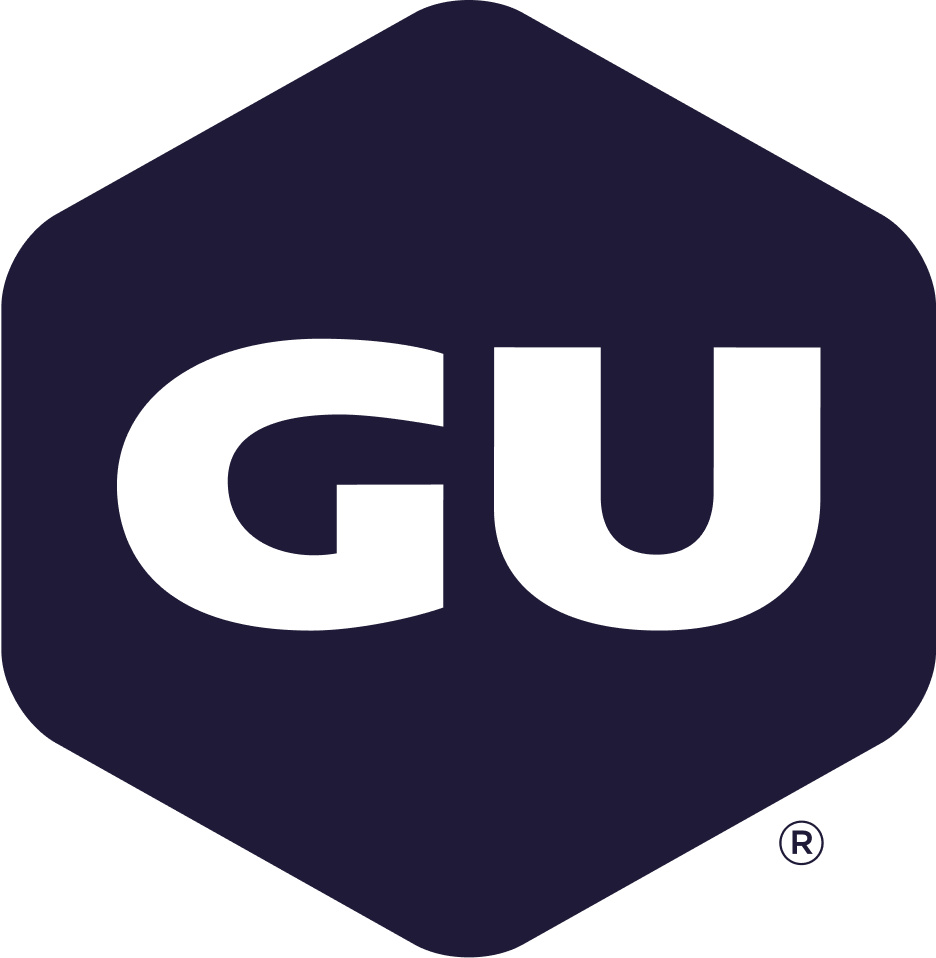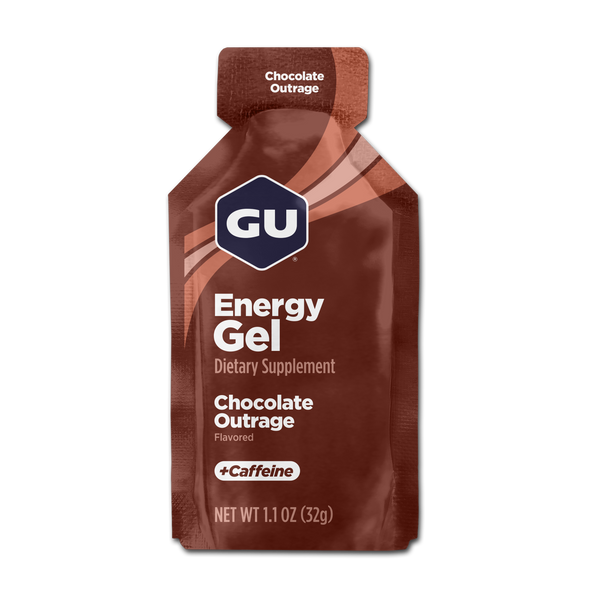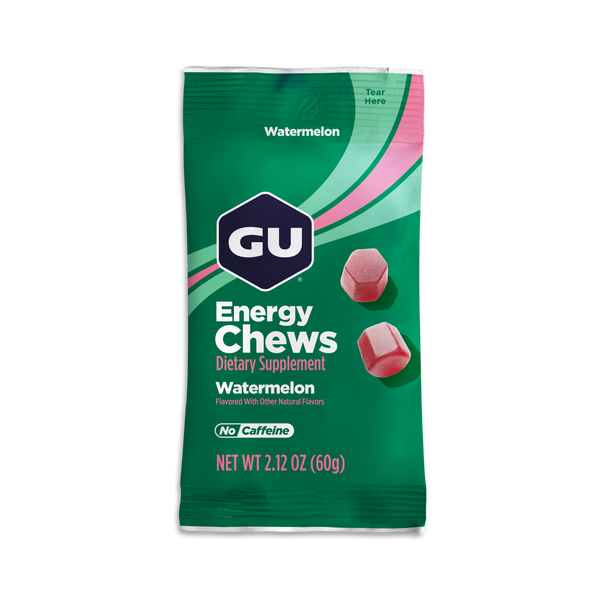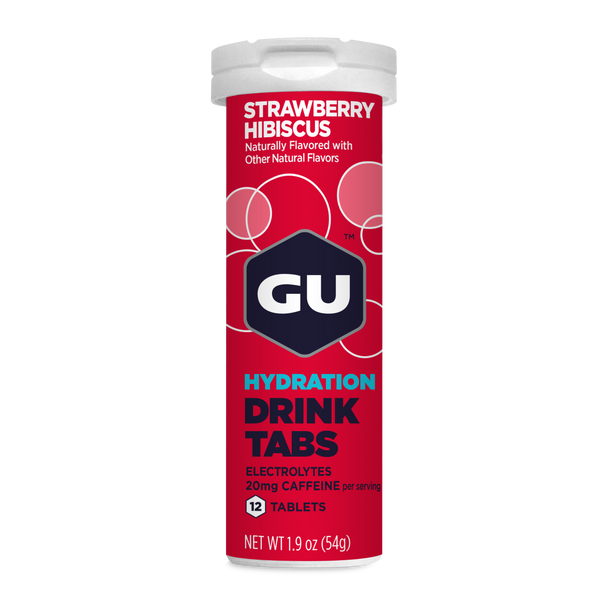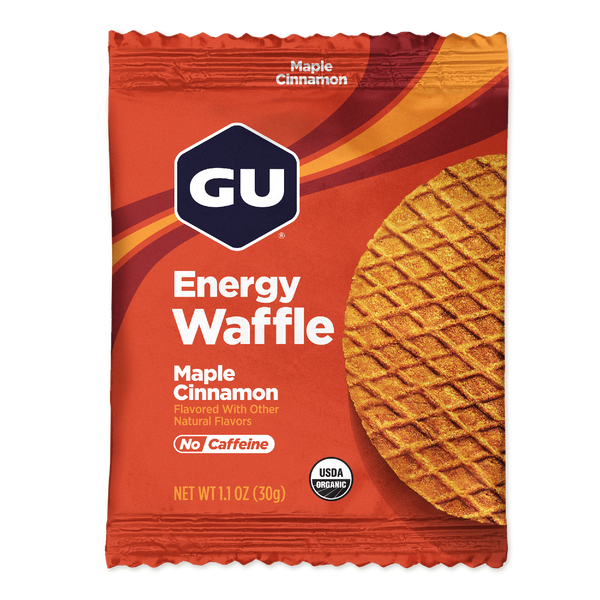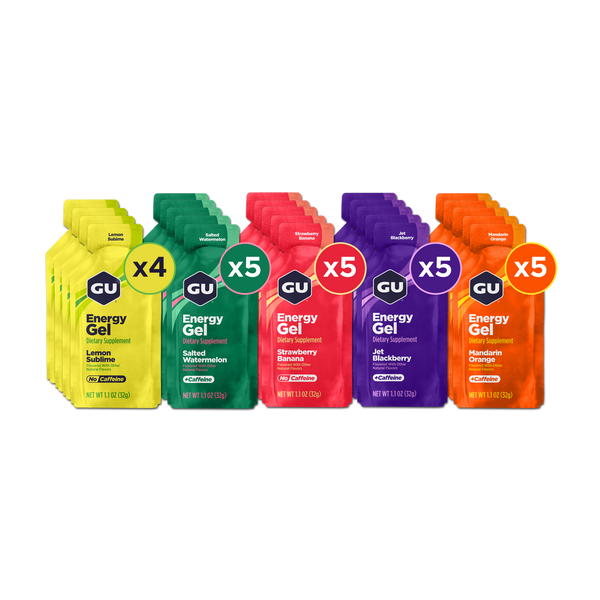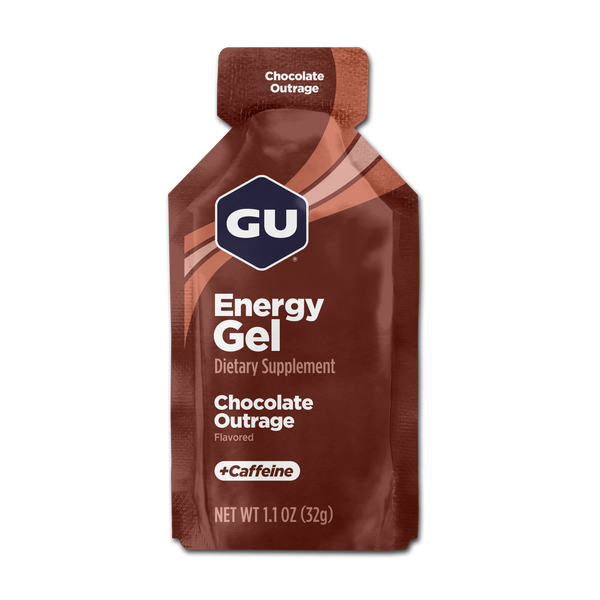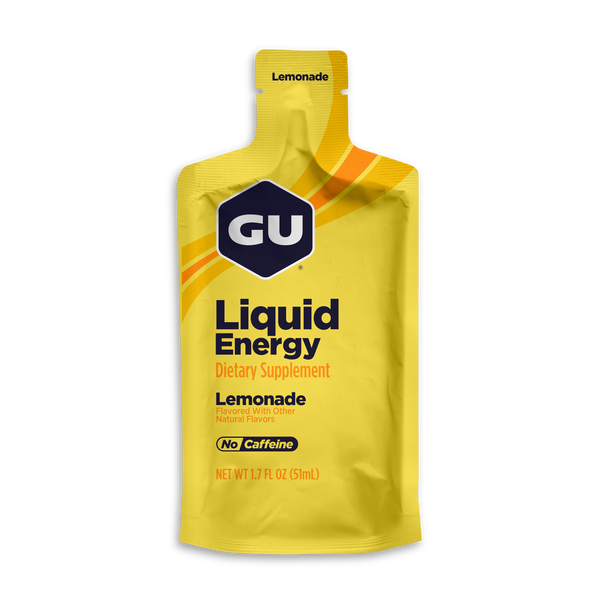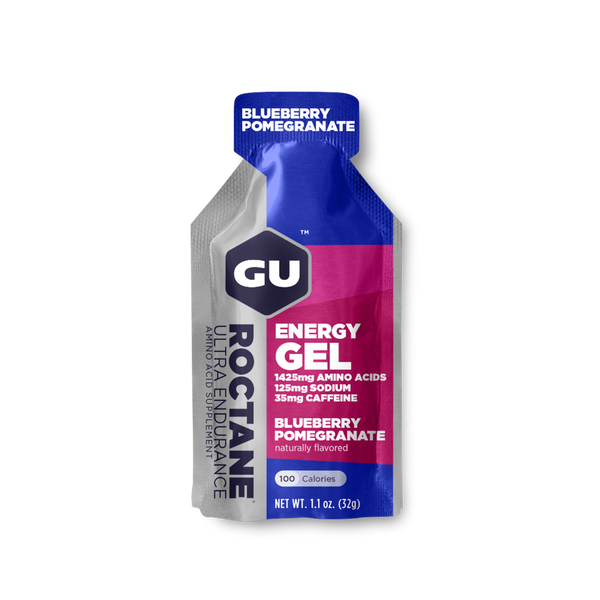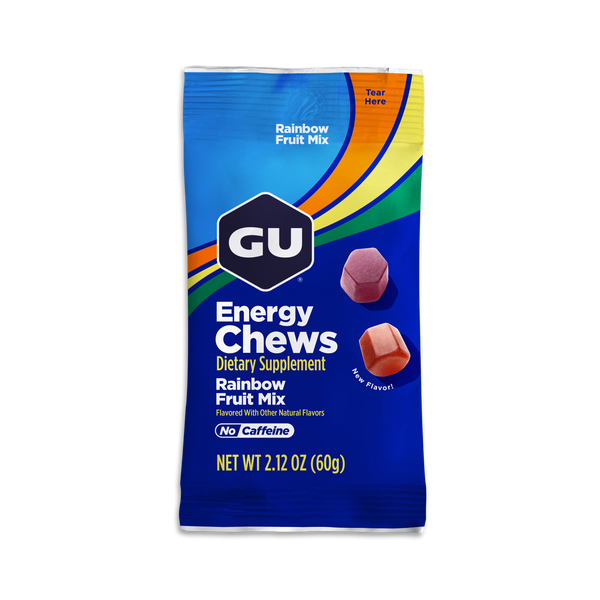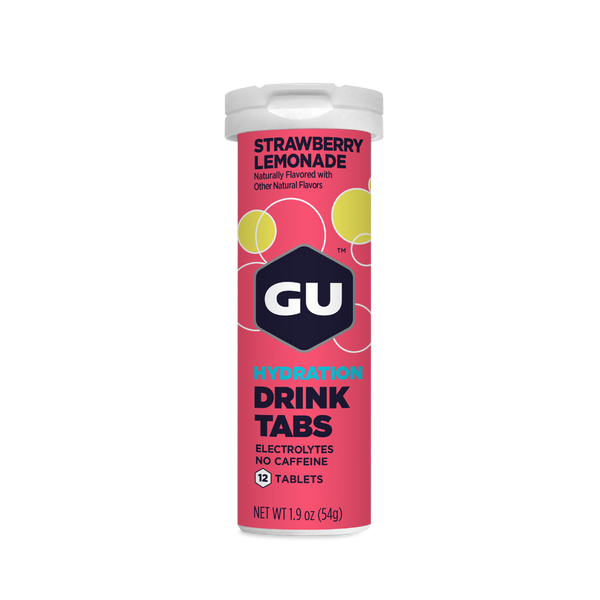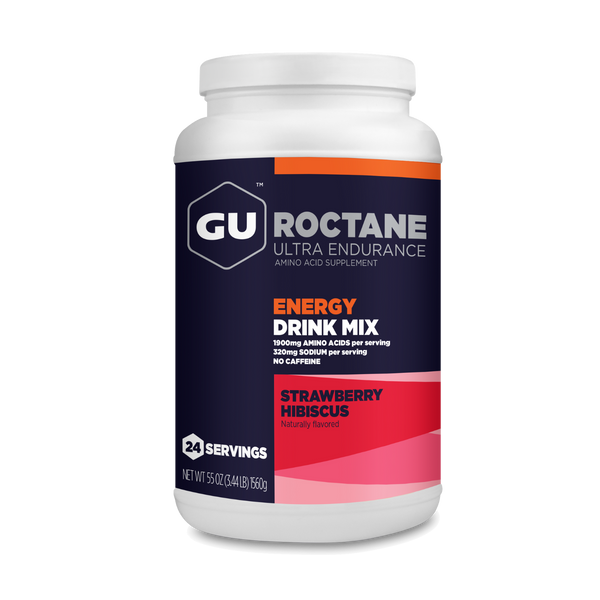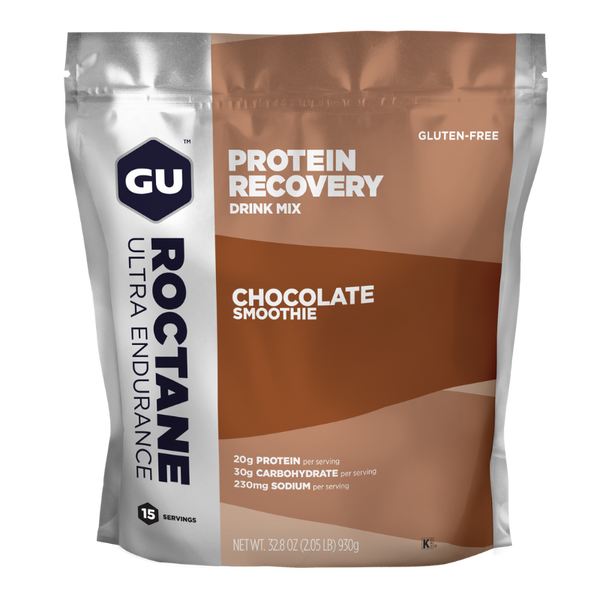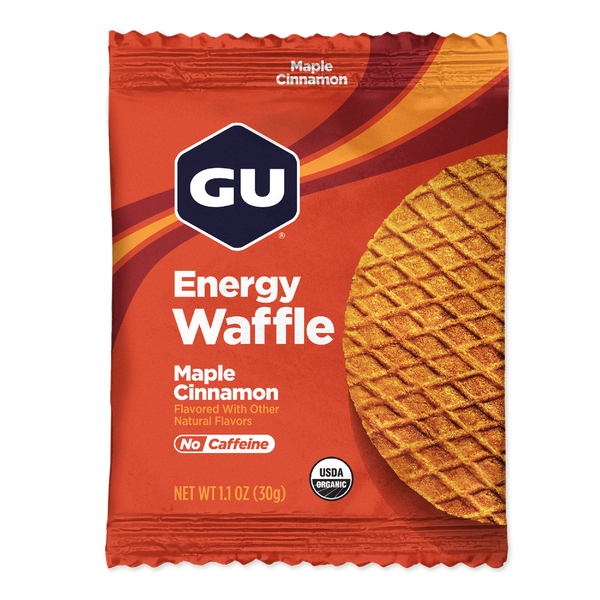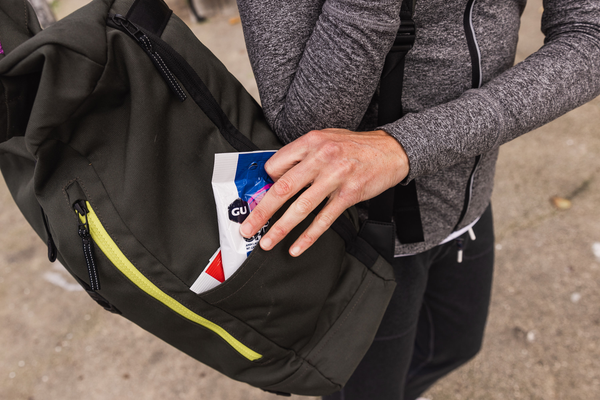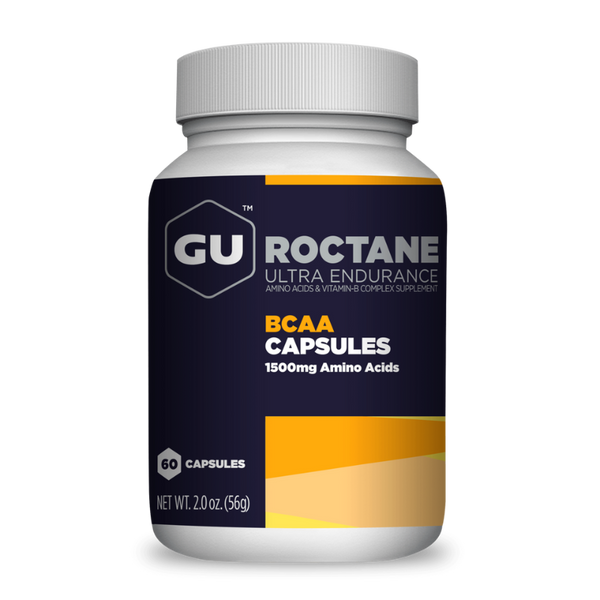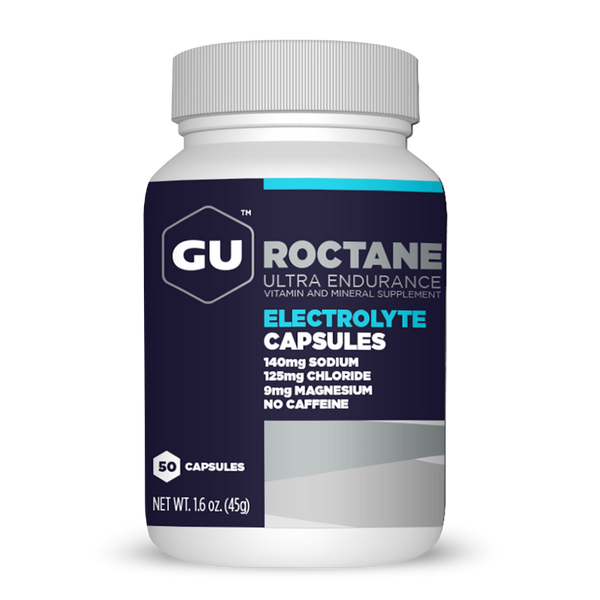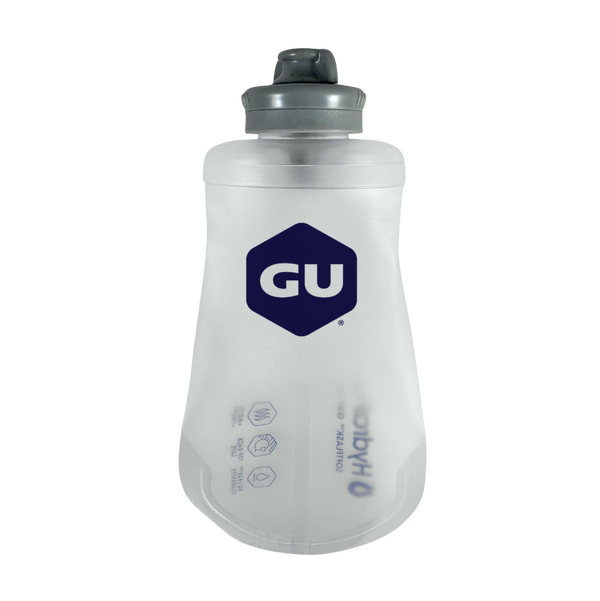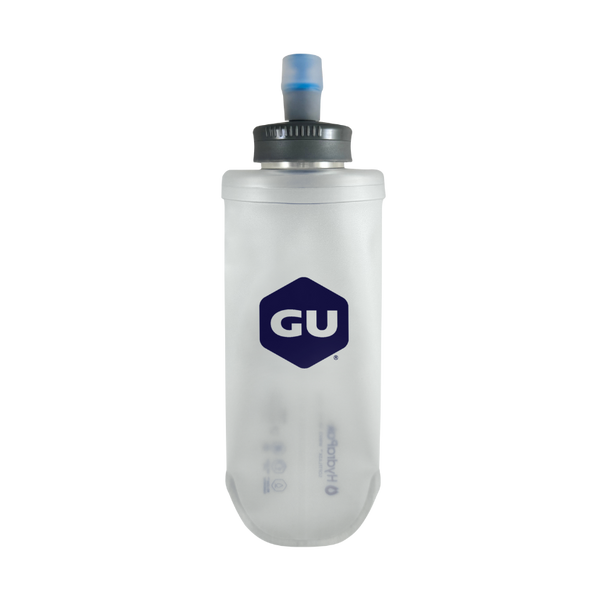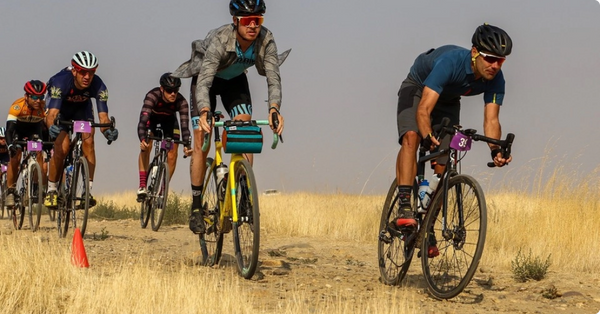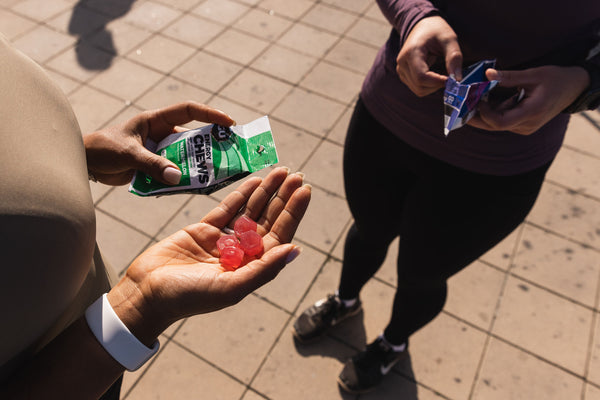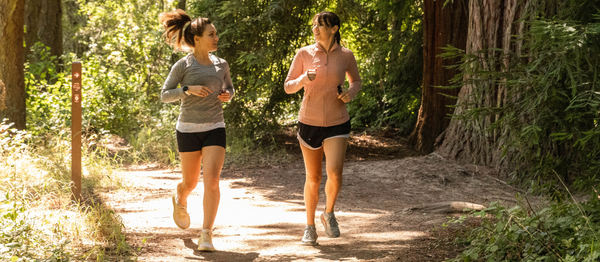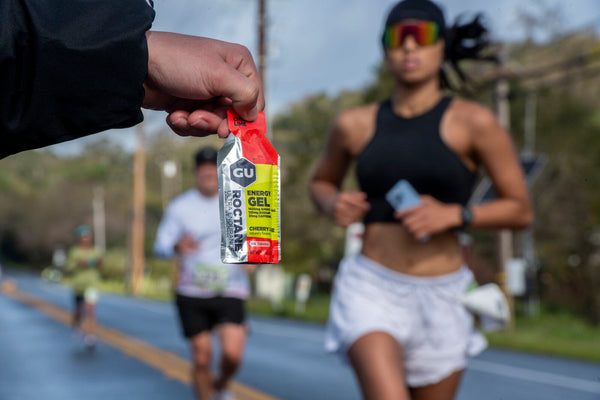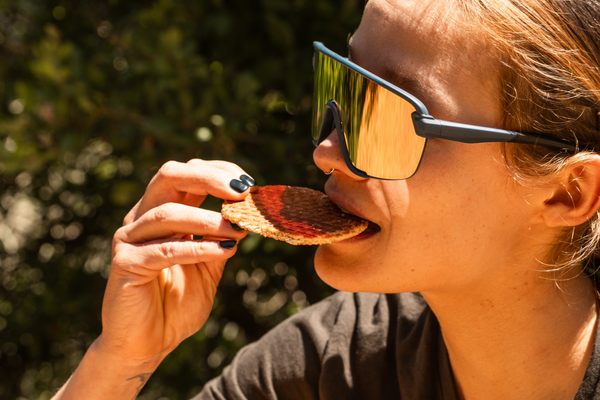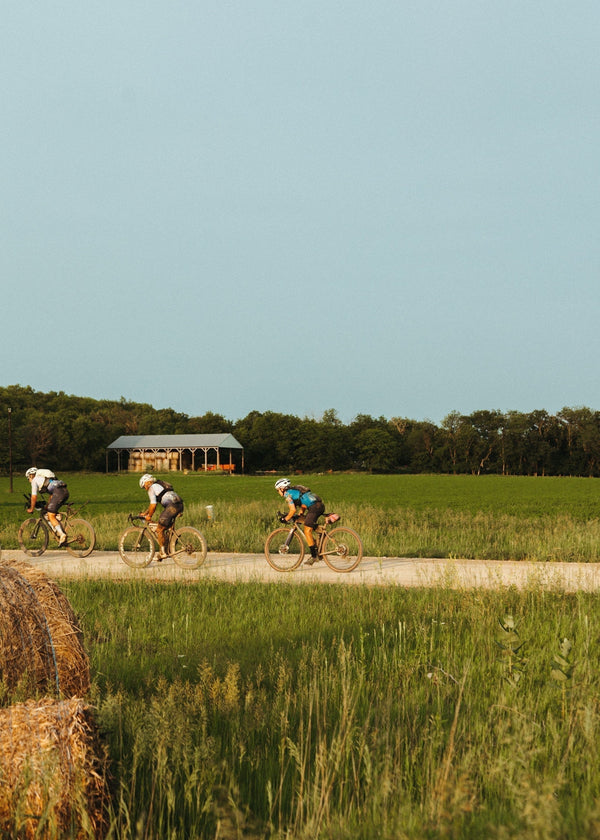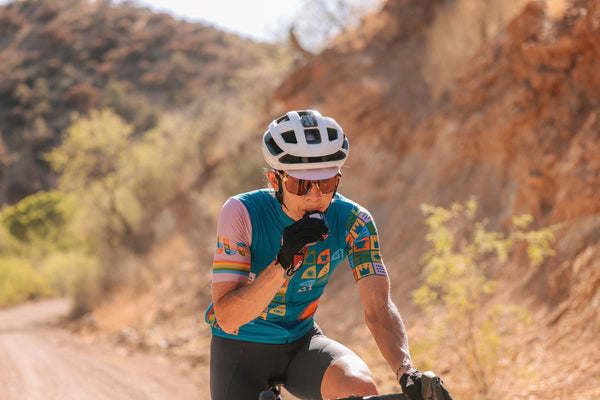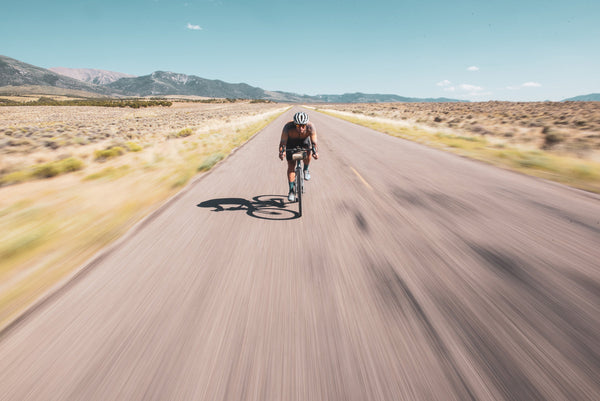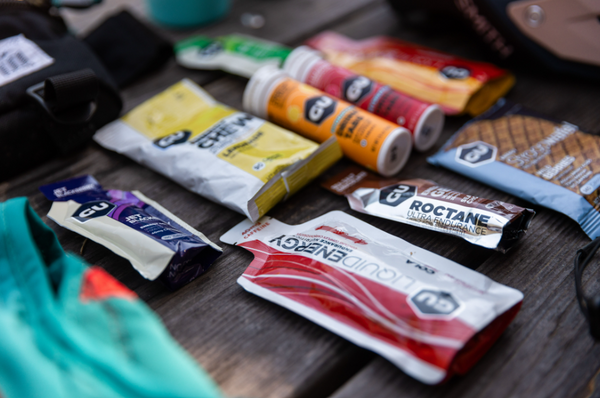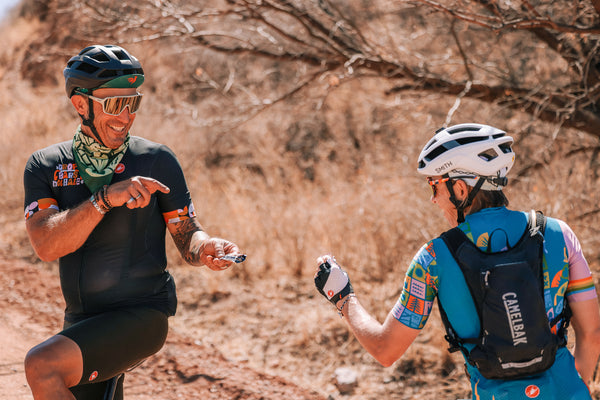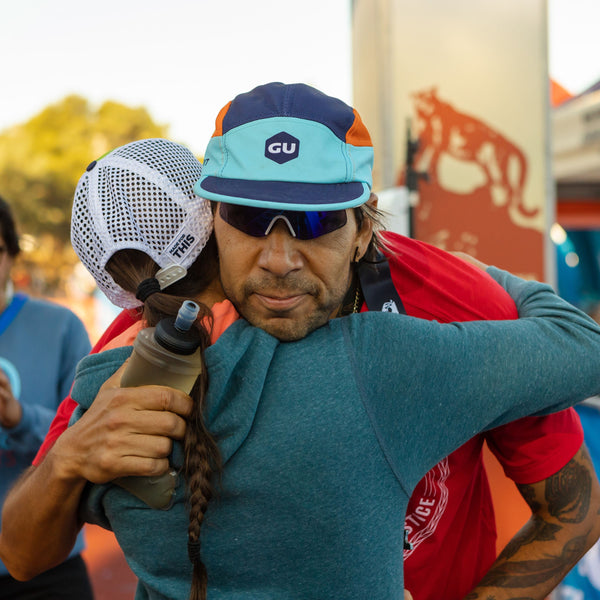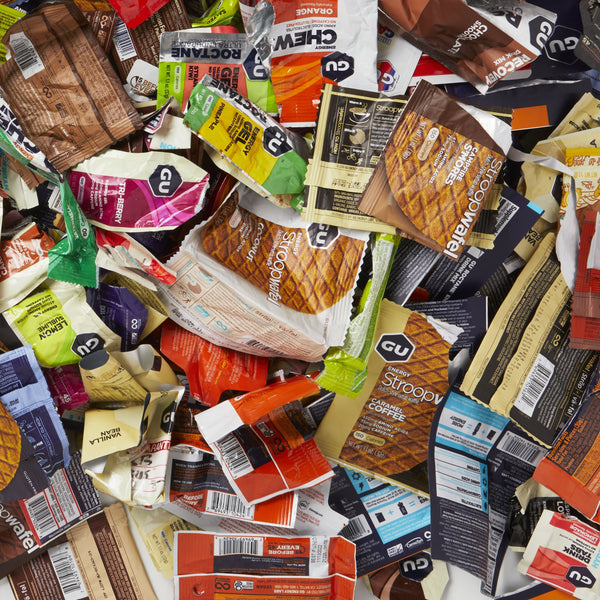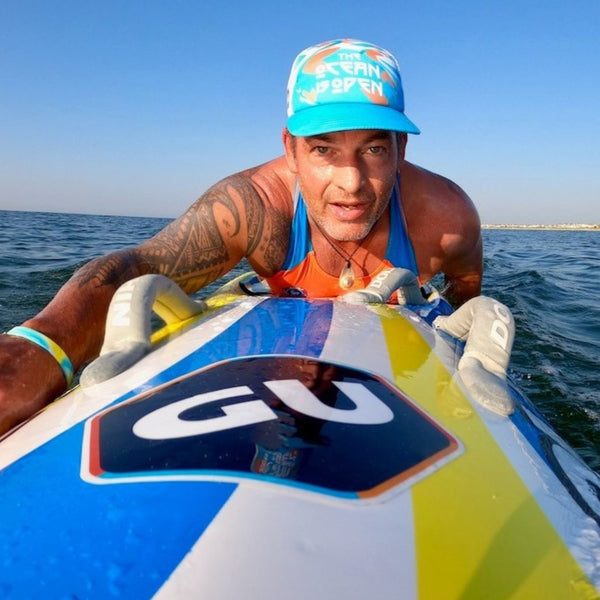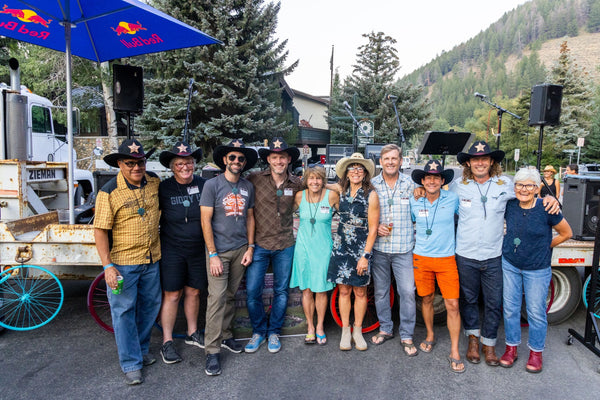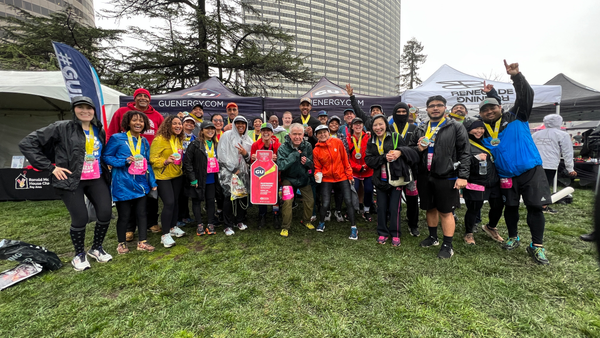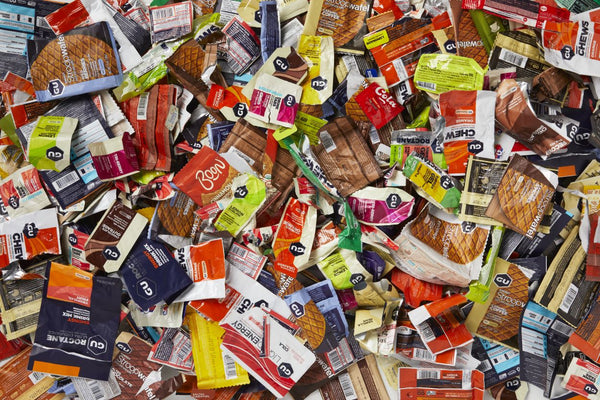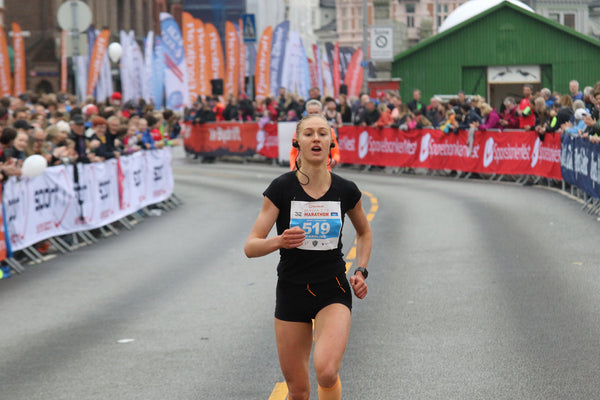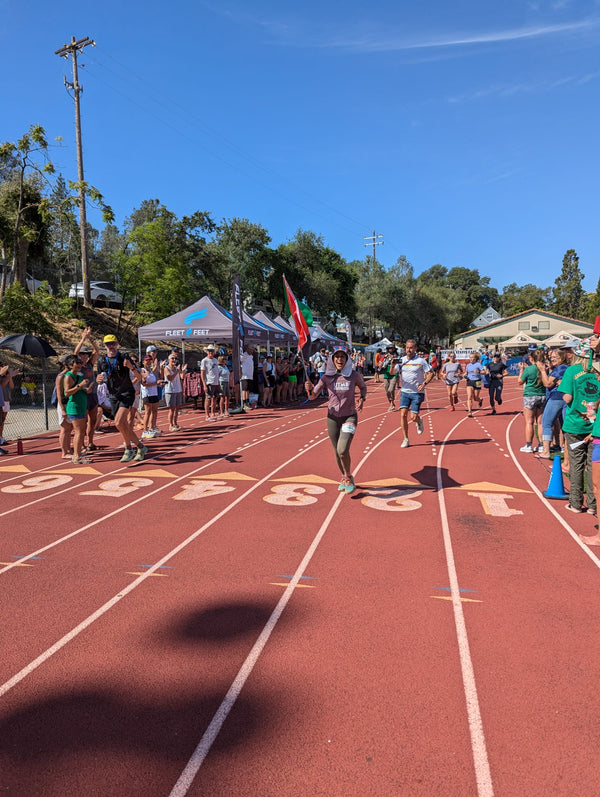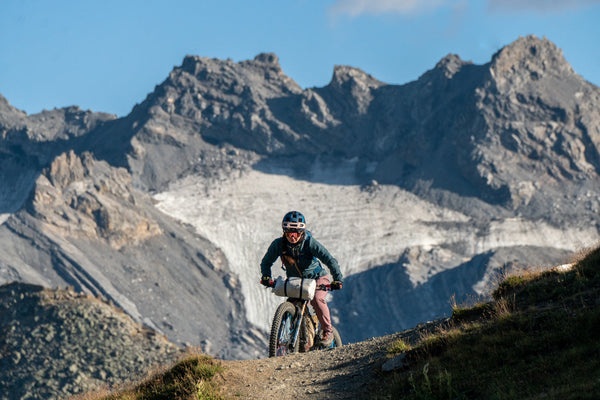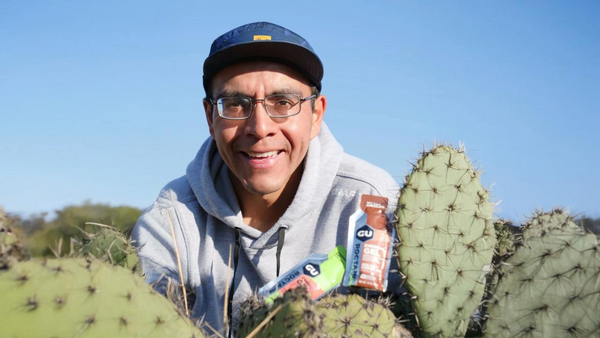June is Pride Month and that means that it’s a time for celebrating the LGBTQ2S+ community and also a time to reflect on how we can collectively make our world safer and more inclusive for all. So to kick things off, GU Energy Labs’s Elite Athlete Manager, Yuri Hauswald, had the opportunity to sit down with Abi Robins, founder of Queer Gravel and the first person to win the non-binary field for Unbound Gravel in 2021. Hauswald and Robins chatted in the run up to Unbound 2023 to discuss the evolution of Queer inclusion in Gravel racing, non-binary categories, and what comes next in the evolution of making Gravel (and all sporting events) more inclusive and safe for all. Here’s what they had to say.
Yuri Hauswald: How would you describe the evolution of the Unbound event in terms of non-binary inclusion?
Abi Robins: Well, the initial creation of the category from Unbound, but also with a lot of these other gravel events, was really a response to what was happening in 2020 and in 2021 with this rash of anti-trans legislation that was happening all over the country, especially in Arkansas where a couple of those bills passed: anti-trans healthcare, anti-trans sports bills, anti-trans bathroom bills, those sorts of things. One was passed in Arkansas right about the time that the UCI and USA cycling announced that the world Cyclocross Championships were going to be held in Fayetteville, Arkansas. And very reasonably, the cycling industry was up in arms about this and all of the Life Time events put out a statement clarifying their stance on trans inclusions; they have inclusive categories for trans women to race in the women's category as long as they meet certain criteria.
But in order to create more space for trans women who don't meet that criteria and for non-binary folks, they created the non-binary category. Unbound was the first event after this wave of protest. So it really started as a reaction. I showed up in 2021 and I was the first non-binary champion of Unbound, but I was also the only one there. And Unbound and Life Time really took the opportunity to platform me and kind of make a fuss about what space they had created in hopes of getting more people to the event. The first year they had it, 2021, I was the only one. In 2022 there were 17 non-binary folx across all their events. So not just the 100 that I was in in 2021, but in the 200, 100, 50, 25, I don't think there was anyone in the XL, but that might change this year. I actually don't know the numbers this year, but I've heard there are even more non-binary folx who've registered for the event. It's been cool to watch because it's really one of those situations where if you build it, we will come. Right?
"Gravel is one of the places where we have the ability to make a powerful and positive social impact that's not just about cycling, but is about the country and the world."
As a non-binary person, I want to show up at events where I feel safe and welcomed and like I can show up as my full self. So if an event has that, then that's the first check for me. If I'm willing to go there and show up at that event. But Unbound really has done a lot to not just create the category, but offering scholarships and partnering with me to help get more people to all of the Life Time events. So it's been really cool to watch how Life Time has stepped up in this area and has really inspired a lot of these other major gravel events to do the same. I feel like at this point, it's time for the rest of the industry to step up and start pulling their weight when it comes to trans and non-binary inclusion in cycling. These events have done a great job and there's really only so much an event can do. An event is pretty far down the line as far as things to do when it comes to cycling. There are so many other touch points that a cyclist has to go through before they're ready for an event, especially an event as large and intimidating as Unbound.
Hauswald: Yeah, agreed. I got to see your podium in 2021, so congratulations to you for being the first. Huge kudos. I think it takes a lot of courage on your part to show up knowing that you're the only one and you're the only one with the spotlight on you. But now look what's happened. Right? You've shed a light on it, and now more are coming and we'll see what happens this year. So what are some of the successes or points of progress that you have seen at Unbound or with other gravel events in terms of inclusion?
Robins: Like I said, Unbound and Life Time are doing a lot to increase inclusion, not just around trans and non-binary issues, but also for BIPOC folx and for Para athletes. They're really using their larger platform to make some of these shifts. But what's been really cool and what's been fun is to watch how some of these smaller events that are maybe a little bit more agile have been able to take the dare that Unbound and Life Time have set and really push the envelope—to see the non-binary category and then raise them equity-based podiums and really extensive rider support programs.
As far as successes go, I always want to shout out what Grounded Nebraska is doing. They've done some really incredible stuff. Again, not just for trans and non-binary inclusion, but for BIPOC riders and Para athletes, all these places where the industry's really pushing. They have an advisory board that helps them set how they operate. So they're taking cues from people in these marginalized communities. One of my favorite things is the equity-based podiums. So they take the pay gap for men and women in cycling and they flip it. So the women's category and the non-binary category both get 20% more of a cash payout than the men's category for their premier race, which is 105 miles, I believe. So it's cool to see how they're really pushing the envelope. Mid South has done some really great stuff this past year with their "Get Here" grant too. They're really working to break down some of the barriers for marginalized athletes to show up and come to these major events, which really are the crown jewel of gravel cycling. It's one thing to go out and ride your bike on these back roads, but it's a different thing to show up and really get to feel like you're part of this vibrant community. That's sadly not accessible for everyone. And it's cool to see events like Unbound and all of the Life Time events and Grounded Nebraska and Mid South and all of these events that are doing so much to help make it easier for folks to show up.
Hauswald: And in case it's lost on folks who maybe are hearing this interview at some point, these are not states where you would expect events to do something like that, which I find really exciting and comforting. I think that's unique to Gravel, too. I don't mean to take us on a birdwalk here, because I wanna jump into our next question, but I love that this is happening in places that you would not expect.
Robins: This is why I feel like gravel is my space and why I'm excited to work in the gravel cycling industry and to do this work in this specific way—because there is so much opportunity for really transformative experiences to take place. These events, they've been going on for years and they've suddenly found themselves in a really tricky political situation. I've experienced firsthand the power of spending time on a bike with someone you don't know and how equalizing and connective it can be. I try not to overstate it, but I do really feel like Gravel is one of the places where we have the ability to make a powerful and positive social impact that's not just about cycling, but is about the country and the world.
Hauswald: Yeah, I love that. So we've talked about some successes. Why don't we go to the flip side now. What are some of the main challenges that still exist in terms of including and creating a welcoming race atmosphere for non-binary people?
Robins: What we just mentioned is a big issue for trans and non-binary folks and for people of color. These major events, they're happening in states that politically lean in a way that can be really hostile towards these marginalized groups. And these events happen on back roads even in what we might call quote unquote safe states. You get out into rural areas and generally those lean more red politically and again, I try not to overgeneralize, but those are areas that are generally more hostile to trans folks and to people of color. I know that's not always the case, but it's the case often enough and that it can make it scary.
So from an event perspective, really getting clear on how an event is equipped to take care of trans and non-binary folx once they get there. That means taking care of everything from making sure there are gender neutral restrooms, which usually is easy because porta-potties, right? But I have seen gendered porta-potties literally right next to each other. One pink one, one blue one. I was driving down the highway and there was a tent revival, and they had a line of gendered porta-potties, and I was like, I've never seen anything more stupid in my entire life, but things like that, right? Yeah. A lot of these events happen in states where it is against the law now for trans people to use the bathroom, and that is a scary thing.
Gravel is not an inherently safe sport. There is an inherent physical risk just getting on your bike and riding these kinds of roads. If something happens, there are medical institutions across this country that would refuse to treat a trans person and knowing where to take someone, knowing how to reach out to people in the community to support somebody if something were to happen. These are all conversations that I had with the Feisty Media and Girls Gone Gravel folks before the Gone Graveling Fest that happened in Bentonville, Arkansas. Before I invite my community to this space, how are you preparing to take care of them if something were to happen?
I think events can do a lot more in that area, and can communicate what they're doing a lot better so that there is a clear course of action. But really at this point, I feel like the real burden of growth is not so much on events anymore. Like I mentioned, events can be pretty far down the line for people who are interested in getting into cycling. The first touchpoint is gonna be your local bike shop. If there's not a safe and welcoming bike shop in your area, you're not gonna wanna go get a bike. Or if you do, you're gonna get a bike, but you're not gonna feel safe getting it serviced asking questions, or to really feel connected to the community. Bike shops are a hub for that. And so I'm hoping that that's where I can shift some of my work over the next season or two to—to help give bike shops more resources in that area.
Hauswald: I know a bike shop you could do that in Emporia. I'm part owner of one now and I have a feeling we're gonna be seeing more of you at some point.
Robins: Yes, absolutely. It's really cool that I've found communities within in the cycling community, little subcultures and sub-communities where there is a lot of trans community centered around bikes and it's a bummer sometimes that the local bike shops can be a gatekeeper even to that community just because it's hard to get a bike and a good reliable tool if you don't feel safe and welcomed. And so I feel like that's a place I'd really like to see more growth. There are definitely cool bike shops in cool cities, but I'd love for it to be a much more ubiquitous thing where a trans or non-binary person can walk into a bike shop and feel safe.
Hauswald: Yeah. Oh, that's an excellent answer. So my next question will pivot a bit. How do we continue to grow the support for non-binary trans categories in cycling events and beyond? I think it was a great point to talk about educating your local bicycle retailer because that is typically the first place that a non-binary trans person would go who's into cycling. But then, legislation is part of that as well as education: what do we need to do to continue this wave of support that we're starting to see? What are your thoughts on that?
Robins: I have two answers. Yes, the first one to the trans folx who are here and listening: make your voices heard, show up at events. Show up at welcoming and safe events, events that are gonna have your back. Get out there and experience this joy. Allow yourself to show up and partake in this because it is good. And then for the cis het folx, the straight folx that are listening: when we as trans folx tell our stories, platform it. Hand us the megaphone and help lift up our voices because it's this telling of story and this sharing of experience that inspires other people. I've lived this firsthand. Shortly after Unbound in 2021 when all this crazy was happening to me. My local community we have in Austin, we have bicycle story night. It's a story night that happens once a month and people just come and talk about something that happened to them on a bike. Sometimes the stories are funny, sometimes they're sad, sometimes they're heartfelt. It really runs the gamut. And I got up and I told this story about what happened to me at Unbound and in the audience that night was somebody high up in one of the climbing gyms here in Austin. And three months later they hosted the first national climbing competition that had a non-binary category. It's really not that hard, right? It's not a hard thing to do, right? Like it's really not.
And so this woman heard my story and was like, we can do that. And then I found out about this a few months later when somebody sent me a screenshot of an interview they had done in a climbing magazine, and they were like, aren't they talking about you? She said, "I saw this at a story night about bikes."
It's being willing and open to share these stories that are truly inspirational to other people. And we've seen a lot of growth in the last couple years in this movement. I don't have a big enough ego to be like, 'oh, it was all gravel and unbound." These things have been in motion for a long time and I was really just in the right place at the right time.
But since Unbound, we've seen this happening in the climbing world. We've seen the marathon and running culture has picked up on it. There's a non-binary category at the Boston Marathon. That's awesome. All of USA triathlon now has non-binary categories all across the country. We've still got work to do at IronMan, but we're getting there. We've seen this big movement and if you build it, we're gonna show up and we're gonna enjoy these things that we love doing with the community that we love doing them with. And so I definitely feel like it's important to share the stories. And if it's not your story, then lift up someone else's story. Hold the door open for folks who wouldn't be able to get into the room otherwise.
Hauswald: Yeah. 100%. Okay, let's talk a little bit about Queer Gravel, because that is your creation. I believe you are the founder of Queer Gravel. So I would love to know, are there any specific projects that you're working on right now with your organization that you would love to share with the world?
Robins: Well, organization is a strong word because it's definitely just me right now, but along the lines of this storytelling, I've been working with Giant Bicycles, Shimano and Life Time for the last almost two years on a film project that follows me and two other non-binary cyclists in preparation for Unbound back in 2022. The film is going to premiere at Unbound this year. And then we're going to be setting up screenings hopefully across the country over the next year or two. It is a really vulnerable story because it shows a lot of me and I feel very protective, not just of my story, but of KC and Apollo's stories as well. But I'm excited for people to see and to get to experience along with us what this is like, what showing up in this community is like for us and, and the joy that we get to experience.
Right now that's the big thing that I'm working on. I have a few other projects waiting in the wings for when I have more support and more finances. I'd love to be able to work on those if anybody listening wants to help me incorporate Queer Gravel as a nonprofit, so please hit me up. You can find me at Abi@queergravel.com. I am in this place where I'm looking for that extra push of support because it's a lot to take on all by myself. And I know I don't wanna do it that way. I want Queer Gravel to be a more community effort. I never had any intention of being at the center of attention. I want to use what's been given to me to help platform and lift up other folks. When it comes to racing, I want the fast folks to be on a podium. When it comes to how we're supporting, I want more voices to be lifted up, and I want more people to feel safe and supported and inspired to get on their bike and go on an adventure.
Hauswald: Yes to all of that. So, what are some of your personal goals for cycling this season? Are you signed up for any other races beyond Unbound? What's on the horizon for you, Abi?
Robins: I am signed up for a lot of races. Not necessarily to race. I'm not really looking for performance. Unbound is really a big one. I didn't finish the 200-mile last year, and so I want it this year. And life is such that I haven't been able to do the kind of training that I did last season. So it's a real crap shoot. I would love to finish the 200 mile, but it's a goal held very loosely. I want to honor my body and where it's at, but I do want to get out there and I want to try because it was a blast last year even though I didn't finish. It was still awesome from start to finish. And then the other race that I feel kind of inspired by is RPI. I really want to try my hand at the stage race this year God willing that the creek don't rise. So I am excited about that. I'm doing a few other events: Grounded Nebraska, Last Best Ride in Whitefish. I'm excited to show up there. I'm just gonna show up and do the short course and have fun.
Hauswald: I just want to thank you for what you're doing. It's an honor to call you a friend and to work with you personally, but also know that GU Energy Labs wholeheartedly supports everything that you are doing.
